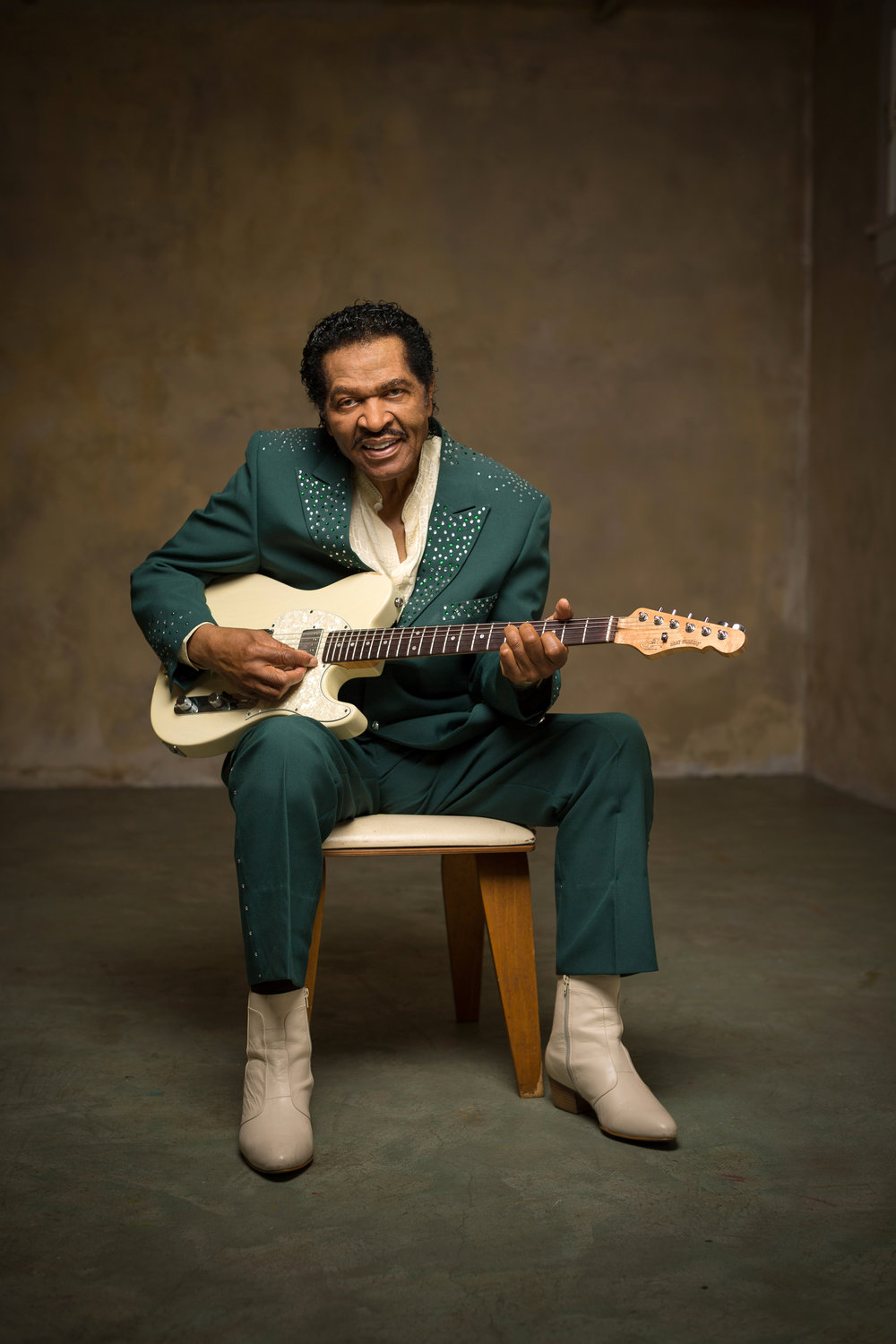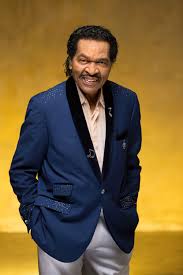There are not many meaningful music genres in the world as the Blues. A genre immediately associated to the history and tradition of a great country like the United States Of America but also to the tribulations and the hard times that the originators of said genre have been through in almost a century since the birth of Blues.
From Son House to R.L. Burnside, from Muddy Waters to Howlin' Wolf, from Leadbelly to Elmore James right through the three legendary King, Albert, B.B. and Freddie, Blues has gone through many different stages and evolution, during the last century but fundamentally, Blues at its very core always remains strictly linked to those artists that have lived and breathed the genre all the way, throughout their whole lives.
You can therefore imagine Bluebird Reviews' thrill, when the opportunity came to have an audience in London, United Kingdom, with one of the very few surviving Blues heroes, the one and only Bobby Rush, somebody that has made of Blues, but also of Soul and Funk, his mission of life.
Born Emmett Ellis, Jr. in Homer, Louisiana, Rush had his first chart-topper in 1971 with the song called Chicken Heads and won his very first Grammy Award at the tender age of 83, thanks to an outstanding album called Porcupine Meat. To these days, this living American music legend is still doing something like 200 live shows every year, an incredible achievement for this 85-years old music hero.
At first glance, Rush doesn't look in the slightest his age and, judging by the live performance that Bluebird Reviews will then witness shortly after the interview, Rush is most definitely living a second youth in many ways. It comes almost natural for our website to ask to this incredible musician and humble gentleman what is the secret behind your artistic and physical remarkable longevity. "Real hunger! Hey Man, we all need some money, ha? (Laughs). No, really, it's just the love for the music and it's the love for people and all the love that people gives me back, that really keeps me going. A man can live for a long time without water and food but can't leave very long without hope. And I have a lot of that, you know, I feel really blessed about being a man with lotta hope. The hope and love given to me by all these people."
Rush' 2016 album Porcupine Meat confirmed the American artist as the undisputed Blues and Funk Supremo, with the record itself received high praises from the whole Worldwide Press. Given the outcome of this phenomenal album, in terms of popularity and success, we ask Bobby Rush what are his immediate memories about the making of that album and whether he's got in mind to release any new material anytime soon. "I am very proud to have Porcupine Meat still going strong even now, as the fact that I won a Grammy Award for that record too. It was important for me to come back with a studio album of that stature that was good enough for me to realize that I can still compete with myself and my music (smiles) on certain levels and I think I've done it well, with Porcupine Meat. I have got a new record coming out on 15th July called Sittin' On Top Of The Blues. I feel like I'm on the top of my game, right now and I'm sittin' on top of all the ups and downs that I had in my life. I am proud to say that I ain't no chip on my shoulders. There were times in my life and career when I was treated really badly but I have no harm towards those who hurt me. I rather prefer to think about the good times I had and still having in this moment in time in my life that amply overshadow all the bad things of the past. The good times give me will power and I am enjoying life every day."
With an ample songbook like the one that Rush has, it must be very challenging for this remarkable artist to choose, for each of his live performances, the songs to be included in your set-lists, night after night. "You are the first ever person asking me this! (laughs). It's a pleasant enough problem to have, for me. When you've got over 377 songs as part of your songbook, how do you choose what get played live on stage? I try to pick those songs, every night, where I think the crowd can relate a bit more to and sometimes it's hard to make everyone happy. So, what I try to do, in order not to disappoint anybody, in my set-lists, I include a medley of 10-12 of my most popular songs, so to be able to please the majority of the audience every time."
Rush moved to Chicago, in the early 50's, something that was most certainly a key step in his life and career, as a musician. The American singer, songwriter and multi-instrumentalist had the opportunity, during his time in Chicago, to hang out often with fellow artists like Muddy Waters, Jimmy Reed or Little Walter, among many others, something that surely must have made a big impact in Rush's musical vision too and perhaps even influenced it, somehow. It becomes therefore inevitable, for our website, to ask Bobby Rush how different is it, in his opinion, Chicago's current music scene, in comparison to the one he lived on his own skin back in that time. "You know, back in those days, all us musicians knew about, it was solely Blues concentrated. When I went to Chicago, at that time, to try and be part of that royal pack of artists you just mentioned, we were devoted fully to the Blues cause. In the more contemporary scene, that doesn't happen anymore because that pack is long gone and especially for young black musicians, they don't have anymore somebody from that pack to look up to. As a consequence, they play something very different from the Blues, the real one, the one that we used to play and, true to be told, some of those new black artists out there, they are even ashamed of who they are, as black people, which is, for me, a terrible thing. They seem to be ashamed of their roots, ashamed to play the music of their roots and ashamed of those fellow black artists that played the blues at such high standards, like Howlin' Wolf, Muddy Waters and many more. I feel like saying to those young black musicians not to be ashamed of where they come from, musically and personally. If you don't love or appreciate the Blues, you very likely don't love or appreciate even your own family. I guess that the hardest things, for those artists, is to be able to sell as many copies as possible of their records, because artists nowadays ain't got the support of the record labels or the radios no more, so you have to try and work your socks off and try and sell as many records as you can at your Merchandise stall, night after night. Fundamentally, if you don't work hard, you don't play. If you don't play live hard enough, you do not sell many copies of your albums because, let's face it, your Merch stall has now become your record shop, because there is almost no record shops left in the US and in many countries in the world. All this make things harder to achieve for those young artists, but we have to keep them in tune with the Blues and let them know that the Blues is something good for them to play and to worship. In my view, most times, what put young black artists down too about the Blues is the fact that writers, promoters and radio deejays talk against the Blues, unless there is a white guy that is playing it. When a white guy does it, they lift the Blues up, but when a black guy does it, they put it down. Things are improving overall a little, in that respect, lately, but to me, not fast enough."

Photo courtesy of Rick Olivier
Bobby Rush has recorded countless albums, in his glorious career so far and, as it happens to many artists, each of Rush's record represents a sonic photograph of the life he was living in that precise moment when he made those records. Our website is curious to know whether, throughout the last 60 plus years of making records of great class and intensity, which has been, according to the artist, the most difficult or particularly challenging record he has ever released. "I guess that it's gotta be the single Chicken Heads and the B side Mary Jane. The record label did not want me to make the Chicken Heads song because they did not think it was appropriate to name a song like that, at the time. They did not believe in that record at all. But I did it anyway and, in the space of six weeks, it went to Number 1, in the Black Radio Market and soon, it spread to a wider audience of a much bigger scale, which would include a more white audience too. The funny thing was that, at the time, the label thought that talking about chickens was not something clever to do and what I tried to explain to them was that I wasn't actually referring to chickens as animals but about something else which was totally unrelated to them. The lyrics of the song say "Daddy told me on his dying bed, give up your heart but don’t you lose your head. You come along girl, what did i do? I lost my heart and my head too". Nothing to do with chickens, as I am sure you may appreciate too. Then, when they asked me what the B-side of Chicken Heads was going to be and I said that it was a song called Mary Jane. The guy at the label said to me "Oh, yeah, I had a woman named Mary Jane, she did me wrong". Then I said "Man, I won't talk about that one, I am talking about women in general! (laughs)."
Rush's father, Emmett Ellis, he was a pastor whose guitar and harmonica playing provided early musical influences to his son. We ask Rush whether he had ever considered to become a pastor too, rather than embracing the power of music. "No, not in that sense. I feel like I am still a biblical scholar, but not in a religious way. I have followed the bible in every part of my life as a road map to me, to follow the right path and to teach me what I should do or not do. I based my life around the bible. I must treat everybody like I would wish to be treated myself. I must do all I can when I can. When it comes the time for me not to be able to do anymore what I can or want to do, I won't regret what I didn't do. You know, I was 83-years old when I won the Grammy, that says it all! (smiles)."
Bobby Rush is not only an American living legend but he is also very much loved and appreciated internationally, with his success and incredible popularity allowing him to reach the four corners of the world, with his music. For somebody like Rush, it must be very difficult to choose his most favourite spot in the world where he loves to get back over and over again, United States aside. "Yes, I do. Right now, d'ya know what I really want to do over and over again? To play live in European countries. I am here in Europe right now not because I need to work, but because I wanted so much to be here and to be known as much as I am in the United States. It ain't many guys like myself that are well known from both sides of the fence. When I am touring the US, I have got a white audience and I have got a black audience. I am kinda two people in one. It ain't many guys able to do that, right now, maybe just B.B. King was able to do that. I am so blessed, because now I have the Bluesmen looking up to me, which is, for me one of the highest honours I can think of."
Historically, when looking at lyrics of Blues, Soul and Funky songs, often the subject of women and love take centre stage. Putting aside Rush's total love, commitment and dedication for music and paraphrasing one of the artist's most popular songs, does some "Night Fishin'" ever help keeping this extraordinary artist so young and fit? "(Laughs), Man, I like that question! What can I say? Yes! (Laughs uncontrollably). You know, Man, my life is what it is, what you see is what you get. I think I am a lovely person, sometimes I am not very easy to get along with, but I think to be an ok guy. Say, for example, the boys in my band. I don't know what they think about me all the time but I feel like, besides being their boss, I am their friend too. We can talk and joke for as long as you like off stage but when I get on stage, then I become the Al Capone Man, you know. When it comes the time to be professional, we let all the silly shit we were talking about before and we get serious, Man, because it's show time. About the women, well, they come and go, Man and sometimes, they go before they come (laughs again uncontrollably)! I have been married twice and, you know, I've got, talking more seriously, ladies and people in general that mean a lot to me. I am blessed, Man. I have got four children with just one lady, five grandchildren, two great-grandchildren and one great-great grandchild and they light my life, every day. I work hard, I had a beer only in my life in 1957 and never had a glass of wine for dinner ever. Never smoke a cigarette and never got high, ever. Overall, I respect those that surround me in my life and I would put myself on the line for them, for my people, no matter what. I sometimes think that I don't really think about them but the truth is, I think about them in the back of my mind always but I have to get myself through the door first, before I can get them through that door too. They can't take me through the door but I can bring them through the door with me. It's the people and the music that maybe keep me young and fit. And maybe, just maybe, some "Night Fishin'" too (laughs).


